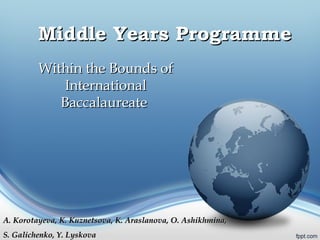
Middle years programme
- 1. Middle Years Programme Within the Bounds of International Baccalaureate A. Korotayeva, K. Kuznetsova, K. Araslanova, O. Ashikhmina, S. Galichenko, Y. Lyskova
- 2. The IB Learner Profile e bl ea In dg qu le ire ow rs Kn rs Thin ke nic a to rs Co mmu Principled Open-minded Risk - take g rs Carin d Re nce fl ec la tiv Ba e
- 3. The MYP aims to enable students to: • build upon their spirit of discovery to develop an understanding and enjoyment of the process of learning, independently and in cooperation with others • acquire knowledge, understanding and skills, and prepare for further learning • recognize the extent to which knowledge is interrelated • learn to communicate effectively in a variety of ways • develop a sense of personal and cultural identity and a respect for themselves and for others • acquire insights into local and global concerns affecting health, the community and the environment, and develop a sense of individual and collective responsibility and citizenship.
- 4. The 3 Fundamental Concepts of MYP Communication Intercultural Awareness
- 5. The MYP Curriculum Framework • language A (ideally, the student’s mother tongue) • language B (a second modern language) • humanities • sciences • mathematics • arts • physical education • technology.
- 6. The MYP
- 7. The MYP • The programme provides learning in a broad base of disciplines; • The subject-group objectives include skills, attitudes and knowledge; • The programme promotes the principle of concurrency of learning; • The programme encourages the use of a variety of teaching and learning methodologies; • The programme emphasizes the development of the whole person.
- 8. The Areas of Interaction • The student focuses on: attitudes values skills
- 9. The Areas of Interaction: Approaches to general and subject-specific learning learning (ATL) skills; Community and how a student engages with his or her service immediate family, classmates and friends; Health and social the range of human issues and how they education affect societies, communities and individuals; Environments how humans interact with the world, which asks students to examine the interrelationship of different environments; Human ingenuity the way in which human minds have influenced the world (the way we behave, think, interact with each other).
- 10. The Final Year of The Programme The Personal Project To Demonstrate the ATL Skills
- 11. Commonality of the areas of interaction Five areas of interaction serve to bring together the varied subject content that will be found in the diversity of cultural and linguistic settings around the world. The MYB areas of They also give interaction include teachers a great students’: opportunity to help their motivations students engage with environmental, interests needs health and community issues
- 12. The Areas of Interaction: • give meaning to what is learned; • provide the contexts for units of work, and for the MYP and the IB learner; • encourage higher-order thinking skills; • provide a framework for student inquiry; • develop positive attitudes and a sense of personal and social responsibility; • can lead students from academic knowledge to thoughtful action; • an interdisciplinary approach to learning; • provide a common language for constructing and organizing the curriculum.
- 13. The Personal Project • A reflection of the Ss’ skills and ability to manage and direct their inquiry; • An excellent opportunity for Ss to produce a truly personal piece of work of their choice; • The five areas of interaction as the basis of the assessment criteria.
- 14. Planning for Teaching and Learning Vertical Planning Horizontal Planning • The selection of • Interdepartmental content; discussions • The agreement on expected levels of achievement.
- 15. Teaching and Learning Methodologies • Formal teacher instruction; • Presentations and inquiry-based projects led by Ss; • Open-ended investigations and problem-solving activities; • Games, role plays, field trips, extra-curricular activities.
- 16. MYP Assessment Students: Teachers: • Self-assessment • Continuous • Feedback assessment according to • Outcome specified criteria
- 17. Regular Internal Assessment • Students and parents’ understanding of the objectives and criteria; • Preparation for final assessment; • Development according to the principles of the programme
- 18. Criterion-Related Model of Assessment Teachers structure varied and valid assessment tasks: • open-ended problem-solving activities and investigations, • organized debates, tests and examinations, • hands-on experimentation, • analysis and reflection.
- 19. Quantitative and Qualitative Assessment • Rubrics • Performance records Responsibility of a • Checklists subject teacher + • Portfolios Self-assessment + Peer-assessment
- 20. Externally Set Exams • MYP doesn’t provide such assessment • Some schools may have national requirements that include externally set exams or tests
- 21. Conclusion The MYP emphasizes: • a broad and balanced education that focuses on values as well as knowledge; • physical, affective, social and intellectual development; • understanding of the interconnectedness and applications of knowledge and skills; • search for relevance and meaning; • helps to acquire a deeper understanding of the concepts.
- 22. Conclusion The MYP is designed: • to help adolescents develop a knowledge of, and interest in, local and global issues; • to encourage international-mindedness and responsible citizenship; • to make an explicit emphasis on communication and intercultural awareness.
- 23. Conclusion MYP requires : • schools and the teachers working as teams in reflecting on, developing, organizing and delivering the curriculum, paying close attention to the perspectives of the students. • It empowers teachers and students to shape a stimulating but rigorous learning experience.